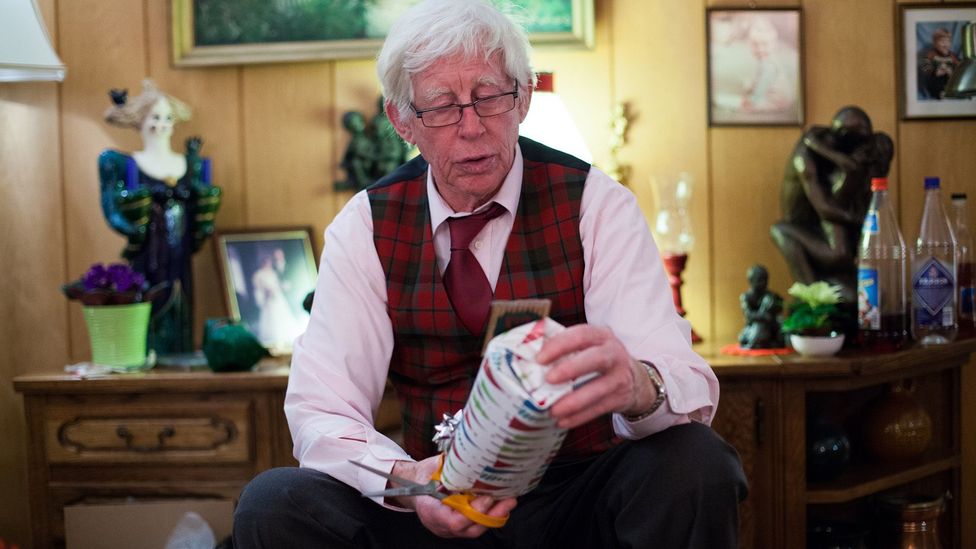Should You Let Someone Know Youre Going to Their Thing or Surprise Them
The science behind giving good gifts
(Image credit:
Getty Images
)

Research shows that giving a bad gift can hurt your relationships. And then how tin you lot be certain you pick something your recipient will love?
I
It's the season to examine your holiday gift listing. You'll have to figure out who gets a nowadays – simply also how much y'all're actually going to spend and, nigh importantly, what to get.
In the UK, the average household spends around £500 on gifts during the traditional vacation season, equalling Americans who spend most $650. And although giving gifts tin can brand y'all happy, communicate your feelings toward the receiver and even strengthen relationships, a less-than-stellar souvenir tin can have the opposite effect.
"Choosing the wrong gift can be kind of risky for relationships because it says you don't have anything in common," says Elizabeth Dunn, a psychology professor at the University of British Columbia in Canada and co-author of Happy Money: The Science of Happier Spending. Her research has also showed that undesirable gifts can sometimes negatively touch on the receiver's perception of a relationship's future potential.
Since you don't want your holiday gift to cause more than harm than good, how can you be certain to choose a souvenir the receiver volition love? Psychology may have the answer.
Don't fret about the toll
Should you merely splurge to prove how much you intendance?
Research has actually shown that spending more does not always guarantee a well-received gift. 1 study found that the more expensive a gift, the more than givers expected recipients to appreciate it. But while givers thought spending more than conveyed more than thoughtfulness, receivers didn't associate the price with their level of appreciation.

Surprising someone with a gift isn't always the best idea – people might be amend off proverb what they want instead of leaving it upward to chance (Credit: Getty Images)
"It seems pretty intuitive that if you spend more, you're going to become a better gift. It turns out that there'southward no evidence that recipients are sensitive to the cost of a gift when they figure out how much they're going to enjoy that gift," says Jeff Galak, an associate professor of marketing at the Carnegie Mellon Tepper Schoolhouse of Business in the US city of Pittsburgh.
Galak, who studies consumer behaviour and determination making, acknowledges that you may take to hit a certain price threshold due to tradition or expectations. But once you meet that price, "it doesn't matter if you buy something more valuable", he says. The gift itself is what matters nigh.
Call back longer term
Galak says the trick for giving a slap-up gift is to think past the fleeting moment of actually handing information technology over, a concept he and colleagues Julian Givi and Elanor Williams establish to be a common theme in studies on souvenir giving, including a paper they authored.
"When givers requite gifts, they're trying to optimise on the moment they give the gift and meet the grin on the recipient'southward face correct in that moment," says Galak. "But what recipients care about is how much value they're going to derive from that over a longer time menstruation."
In other words, information technology might non exist exciting to watch a friend or family member open the gift of a motion picture-streaming subscription, so you might be less likely to requite 1. But a recipient may actually honey information technology, since it's a souvenir that can be enjoyed oftentimes over time.
Forget virtually uniqueness
Galak too suggests not getting hung up on giving the near unique gift out in that location. Sometimes something that many people desire or many others accept can be exactly what someone wants.
One written report showed that nosotros tend to focus on a recipient'southward unique traits and personality equally we shop for them. But this hyper-specificity leads us to ignore other aspects of their wants and needs, which may brand u.s. buy them an inferior souvenir. Nosotros also tend to want to buy different gifts for multiple people, fifty-fifty if they might all be happier with the same affair – and might never compare gifts at all.

Rather than using your own preferences to buy a gift, focus on shared interests get-go and choose something you both would enjoy (Credit: Getty Images)
In order to experience like a good gift giver, people erroneously feel like they need to diversify the gifts, even at the cost of giving the all-time present, according to Galak. You might also overlook buying something that you own because you don't want to undermine your own sense of individuality.
So those trainers of yours that your friend loves? Don't avoid gifting a matching pair merely because yous want to be unique.
Buy based on shared interests
To shop better, psychology professor Dunn suggests starting with something you have in common with the recipient. She says that instead of using your own preferences and adjusting them for how you and the recipient diverge, focus on what you share and option a souvenir from in that location.
"People are better at choosing something for themselves," she says, "so if yous accept something in common with somebody, get something that shares the same affinity, because something you would similar will more likely be something they similar."
For an even stronger gift think about a common interest you share and buy something that your recipient tin can feel – say, concert tickets or a cooking class. Research has also shown that experiential gifts tin can bring y'all and the recipient closer, even if y'all don't experience the gift with your recipient.
Ask them what they want
If you accept zip in common, though, Dunn recommends just request the recipient what they want, or to work off a registry. In fact, enquiry shows that people are more beholden of gifts they ask for than ones they don't.
"People want to be creative and surprise the recipient," says Dunn, "but the better gift will exist any it is they say they want."
Galak agrees that the simplest way to brand a person happy with a gift is asking them what they want. It's not an reply most people like, he says, considering good gifts are supposed to be a 'surprise' – even though science has disproven this.

Monetary value means less than you may think, as souvenir receivers tend to care nearly the intention and thought more than so than the actual particular (Credit: Getty Images)
"Asking somebody what they want is seen equally taboo. And that's a shame," he says. "We would all be better off if nosotros gave people what they want."
Don't overthink information technology
At the end of the twenty-four hours, don't fret too much near giving a terrible gift: truly bad gifts are rare.
Unless something is wildly inappropriate, the recipient volition feel some level of appreciation. Galak says that over the course of his research he has asked thousands of participants well-nigh gifts they take received, and he rarely hears someone talk about a bad souvenir. And even if you lot do requite a sub-par gift to someone you are shut to, you lot may be saved by your thoughtfulness. That's because when someone gives a bad gift, it triggers the receiver to think about why the giver chose it.
"When someone does something puzzling that needs to be explained – like requite a bad souvenir –that'due south when you call up about what'due south on the other person's listen," says Nicholas Epley, a professor at the University of Chicago Booth School of Business who studies how we take other people's perspectives and make judgements. His research shows that if your recipient feels like yous at to the lowest degree spent a lot of time making your selection, they'll capeesh the try that went into choosing a less desirable gift.
In other words, the old aphorism 'it'due south the thought that counts' really might be truthful.
And fifty-fifty if you don't go the souvenir right, someone will still feel good in the state of affairs: you lot. "When gift givers put a lot of idea into a gift, they feel closer to the recipient," says Epley. "Even if the recipient isn't so much affected past the thoughtfulness, the giver is."
Source: https://www.bbc.com/worklife/article/20191206-the-science-behind-giving-good-gifts
0 Response to "Should You Let Someone Know Youre Going to Their Thing or Surprise Them"
Post a Comment